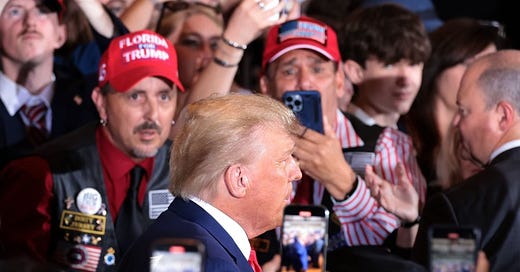Guerilla lawfare will break out if Trump loses
The weeks after the election may be some of the most important in a generation.
On the eve of one of the most consequential US elections in history, the world is waiting to see just how big a fight Donald Trump will put up if he doesn’t win back the White House. Let’s be honest, by now, few expect him to go gently into that good night.
Much rides on whether the systems that defend the planet’s most powerful democracy will prevail. With autocrats in the ascendant globally, any loss of faith in the US electoral system has enormous implications. The weeks after the election may be some of the most important in a generation.
Already the former president has been laying the ground for a massive campaign of lawfare in the event of his defeat.
He has claimed (without evidence) that illegal immigrants are voting en masse.
He has tried to undermine confidence in voting machines and questioned the validity of ballots cast overseas.
He has brought the fight to Britain, accusing the Labour government of foreign interference in America’s election.
Meanwhile, Microsoft has told a Senate hearing that these final 48 hours of the campaign could see a huge spike in foreign interference that might give Trump more fodder to claim the election is rigged.
It’s likely we won’t know just whether Trump’s claims have cut through until after 6 November. What we do know is that false information is spreading faster and wider than in 2020 thanks to AI and the amplification provided by Elon Musk’s X.
So how will it play out if Trump loses?
Claims and counter claims will ricochet through the judicial system, which at its highest level is now dominated by Trump appointees.
For starters, he will demand recounts in every swing state that he loses.
Having observed these recounts, they are never as straightforward as they seem. They are easily manipulated with plenty of room for human error.
Recounts are normally controlled by local officials, many of whom are now unapologetic MAGA followers who will do everything in their power to ensure a Trump victory.
In recent elections, a small number of local officials have temporarily refused to certify results and only been compelled to do so under court order.
Even if the Harris campaign files their own suits forcing local officials to follow proper procedure, many swing states’ supreme courts are dominated by conservative judges.
Then there is the fraught issue of certification. States must certify their outcomes by11 December by law and then the presidential electors meet six days later to send the results to Congress.
We can expect huge MAGA protests in the most contested states as their electoral colleges convene before the deadline, casting a shadow over state electors who know that violence is no longer out of the question.
On 6 January — a day etched in history by the deadly Capitol Hill riots – a new Congress will be called upon to certify the election result, and much will depend on who controls the balance of power.
If the Democrats retake the House of Representatives and maintain their Senate majority, there should be no issue in certifying a Harris Presidency.
But if the Republicans control both chambers, Trump and his allies could delay or even refuse certification. That is assuming a Speaker has even been chosen. In 2023, that took four days and 15 votes.
If the certification process is frustrated, president-elect Harris would take her case to a Supreme Court dominated by Trump appointees. This is the point of maximum danger, with a genuine possibility that a Harris win could be overturned.
Recent surveys show how concerned my fellow US citizens are about this dangerous moment for our democracy: a recent YouGov survey found 14 percent of them feared civil war could break out after 5 November.
However, I would still argue that lawfare, not warfare, is the real risk to American democracy in 2024. Beyond the next 6 Jan, we enter unchartered territory.
Bryan Sullivan is a leading US attorney, representing well-known individuals and corporations






